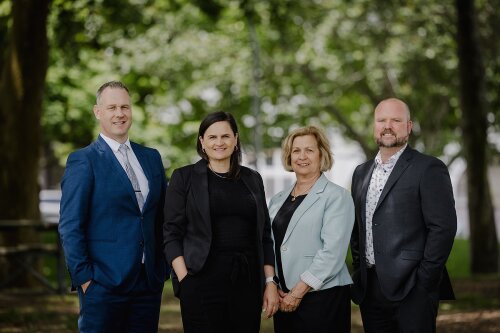Best Nonprofit & Charitable Organizations Lawyers in Cambridge
Share your needs with us, get contacted by law firms.
Free. Takes 2 min.
List of the best lawyers in Cambridge, New Zealand
1. About Nonprofit & Charitable Organizations Law in Cambridge, New Zealand
Nonprofit and charitable activities in Cambridge follow New Zealand wide rules designed to promote transparency and good governance. Most groups operate under two common structures: registered charities and incorporated societies. Each structure carries distinct obligations and benefits.
Charities Services, part of the Department of Internal Affairs, regulates registered charities and maintains the national charity register. This regime supports public trust by requiring annual returns and governance standards from eligible organizations. Cambridge groups share these responsibilities with the rest of the country.
Some communities in Cambridge also organize as incorporated societies under the Incorporated Societies Act 1908. This framework governs membership, rules, and reporting. For many small clubs and cultural groups, this structure provides a simple pathway to formal governance while avoiding complex corporate requirements.
Tax treatment is another key factor for charities in Cambridge. The Income Tax Act 2007 sets out how charitable organizations may qualify for tax exemptions and donor tax credits. Compliance with tax rules helps charities fundraise effectively and maintain public confidence.
National regulatory changes can affect local Cambridge groups. The Charities Act regimes and amendments influence governance duties, reporting, and fundraising transparency. It is important for Cambridge organizations to stay updated on current texts via official sources.
Charities Services emphasizes that registration unlocks access to charitable tax concessions and formal recognition as a charity.Source: Charities Services, dia.govt.nz
New Zealand legislation for charities is available on the official NZ Legislation site and is the ultimate reference for current law.Source: New Zealand Legislation, legislation.govt.nz
For authoritative, up-to-date guidance, consult official government resources listed in the Additional Resources section.
Cambridge-based groups should plan a local compliance approach that aligns with national rules and any district council requirements for events and fundraising activities.
2. Why You May Need a Lawyer
Starting a new charity in Cambridge often requires legal guidance on structure and governance from the outset. A lawyer helps select the right form, draft governing documents, and plan for compliance with reporting obligations.
Drafting a constitution, rules, and governance policies is essential for credible operation. A solicitor or legal counsel can ensure conflict of interest policies, board roles, and member rights are clearly defined and enforceable.
If you plan to run fundraising campaigns or apply for charitable status, a lawyer can supervise the application to Charities Services and navigation of Inland Revenue requirements. This minimizes delays and errors in the registration process.
Mergers, restructures, or dissolution of a charity in Cambridge require careful legal handling. A lawyer can coordinate constitutional amendments, asset transfers, and creditor protections to avoid disputes or governance gaps.
Employment and volunteer management present unique risks. An attorney can draft employee contracts, volunteer agreements, and policies to align with NZ employment law and charity-specific obligations.
Tax compliance and grant reporting are ongoing needs for Cambridge charities. Legal counsel can advise on tax exemptions, donor eligibility for tax credits, and proper documentation for reporting to Inland Revenue.
3. Local Laws Overview
The core national laws governing nonprofit and charitable organizations in Cambridge, New Zealand include several key statutes. Understanding these helps ensure compliance in day-to-day operations.
Charities Act 2005 (and related amendments) - This is the primary statute governing registered charities in New Zealand. It sets out the criteria for charitable status, governance expectations, and reporting requirements. The Act is administered by Charities Services and works alongside regulatory updates that may alter obligations from time to time. For current text and amendments, refer to NZ Legislation.
Incorporated Societies Act 1908 - This act regulates incorporated societies, many Cambridge clubs and associations choose this form. It covers membership, governance rules, and annual reporting. It remains a common pathway for small voluntary groups seeking formal status without complex corporate structures.
Income Tax Act 2007 - This legislation governs tax concessions available to charities and how donors can claim tax credits. Charities must meet criteria in the Act to maintain exemptions and ensure donors receive correct tax treatment. Inland Revenue provides guidance on eligibility and compliance.
Recent trends show ongoing alignment between charitable governance and digital reporting. Charities Services has emphasized online applications and annual returns, with guidance continually updated on their site. For the latest authoritative information, review the official sources linked below.
Refer to these official sources for current requirements and official texts:
Charities Services (Department of Internal Affairs) - Registration, governance requirements, and reporting for NZ charities. https://www.charities.govt.nz
New Zealand Legislation - Official NZ legislation site for the Charities Act 2005 and related statutes. https://legislation.govt.nz
Inland Revenue - Tax guidance for charities, including exemptions and donor rules. https://www.ird.govt.nz
4. Frequently Asked Questions
What is a charity in New Zealand?
A charity in NZ is an organization established for purposes that are charitable under the Charities Act 2005. It must have a recognizable public benefit and can apply for tax exemptions and donor tax credits.
How do I register a charity with Charities Services?
You must prepare governing documents, identify charitable purposes, and complete the registration application. The process requires details about trustees, financial plans, and governance policies.
What is the difference between a charity and an incorporated society?
A charity seeks public benefit and tax concessions; an incorporated society focuses on membership governance under the Incorporated Societies Act 1908. A group can be both a registered charity and an incorporated society if it meets both criteria.
How much does it cost to register a charity?
Registration fees vary by type and size of the organization. Fees are published by Charities Services and may change; check the current schedule before submitting an application.
How long does the charity registration process take?
Processing times depend on completeness and complexity. Typical timelines range from a few weeks to a couple of months if all information is in order.
Do I need to appoint directors or trustees in Cambridge?
Yes. Most charity structures require a board of directors or trustees. You should prepare governance policies, roles, and conflict-of-interest procedures for board members.
What is the process to apply for tax exemptions for a charity?
Once registered as a charity, you may apply for tax exemptions with Inland Revenue. This involves providing charity registration details, financial statements, and governance information.
What is the difference between a charity and a donor-funded group?
A charity primarily relies on public trust and public benefit to qualify for tax concessions, while donor-funded groups may not meet the public benefit requirement and may not receive the same concessions.
How do fundraising rules affect Cambridge events?
Fundraising campaigns must comply with NZ consumer protection and fundraising regulations. If you solicit donations publicly, you may need to disclose your charity status and comply with reporting obligations.
When must annual returns be filed with Charities Services?
Charities typically file annual returns to maintain their registered status. Filing deadlines and required financial reporting depend on the charity’s size and structure.
Do I need to consult a lawyer for a small charity setup?
While not mandatory, early legal advice helps prevent governance gaps, ensures proper constitution drafting, and reduces later disputes or compliance problems.
Is there a difference in requirements for Cambridge-based charities vs nationwide groups?
No inherent legal difference; however, local events or fundraising may require district council approvals and compliance with local bylaws in addition to national rules.
5. Additional Resources
- Charities Services - Regulation, registration, and reporting for NZ charities; part of the Department of Internal Affairs. https://www.charities.govt.nz
- Inland Revenue - Tax rules, exemptions, and donor tax credits for charities. https://www.ird.govt.nz
- NZ Legislation - Official source for Charities Act 2005, Incorporated Societies Act 1908, and related statutes. https://legislation.govt.nz
- NZ Companies Office - Information on forming and maintaining incorporated societies and other entities. https://www.companiesoffice.govt.nz
6. Next Steps
- Clarify your organization's purpose and choose the right legal structure (charity, incorporated society, or other). This helps target the correct regulatory path within 1 week.
- Gather foundational documents such as draft constitution, governing rules, list of initial trustees or directors, and a basic financial plan. Complete within 2 weeks.
- Consult a Cambridge nonprofit lawyer for a no-cost initial briefing to assess compliance needs and potential risks. Schedule within 2-3 weeks.
- Prepare governance policies and a conflict-of-interest policy tailored to your group. Have these reviewed by counsel within 2-4 weeks.
- Determine if you will seek charity registration and tax exemptions. If so, prepare supporting documents and contact Charities Services and Inland Revenue. Aim to submit within 4-6 weeks.
- Engage a lawyer to draft or review your constitution, memorandum of association, and annual reporting obligations. Complete engagement within 1-2 weeks after decision to proceed.
- Set up a long-term compliance calendar with annual returns, board meetings, and financial audits if required. Implement within 1 month and maintain thereafter.
Lawzana helps you find the best lawyers and law firms in Cambridge through a curated and pre-screened list of qualified legal professionals. Our platform offers rankings and detailed profiles of attorneys and law firms, allowing you to compare based on practice areas, including Nonprofit & Charitable Organizations, experience, and client feedback.
Each profile includes a description of the firm's areas of practice, client reviews, team members and partners, year of establishment, spoken languages, office locations, contact information, social media presence, and any published articles or resources. Most firms on our platform speak English and are experienced in both local and international legal matters.
Get a quote from top-rated law firms in Cambridge, New Zealand — quickly, securely, and without unnecessary hassle.
Disclaimer:
The information provided on this page is for general informational purposes only and does not constitute legal advice. While we strive to ensure the accuracy and relevance of the content, legal information may change over time, and interpretations of the law can vary. You should always consult with a qualified legal professional for advice specific to your situation.
We disclaim all liability for actions taken or not taken based on the content of this page. If you believe any information is incorrect or outdated, please contact us, and we will review and update it where appropriate.









